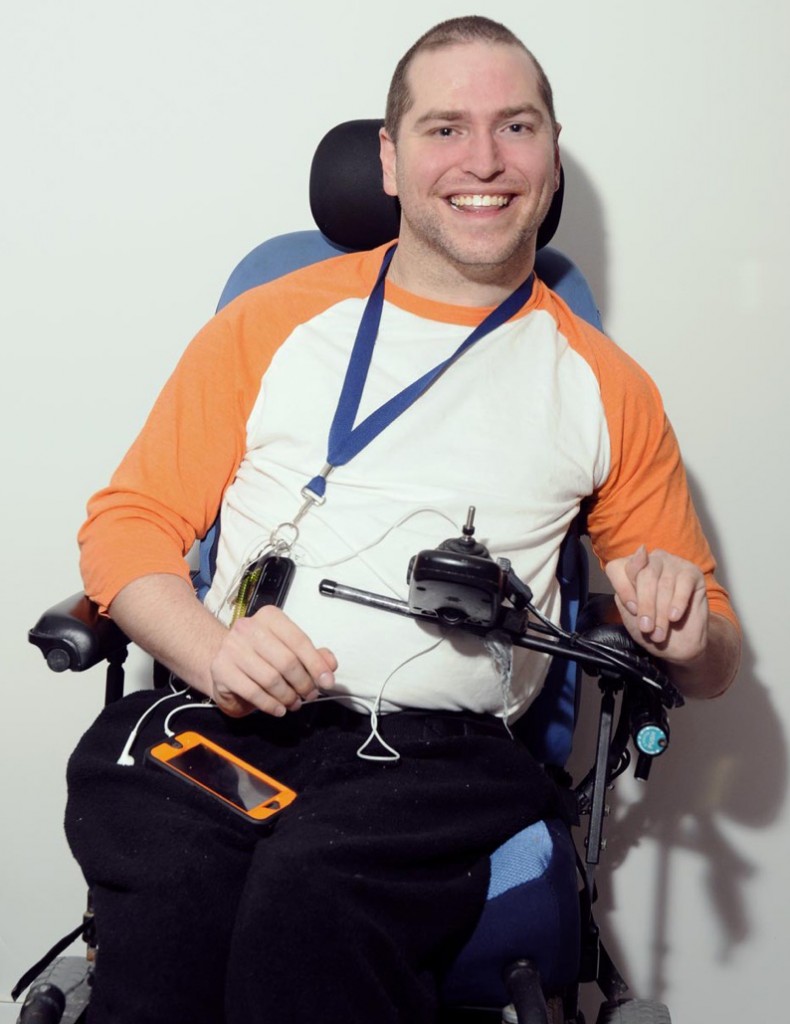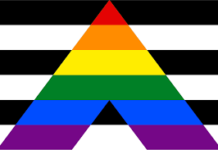
5 Things Everyone Should Know About Being A Queer Cripple* :: So you met this really cute, funny guy recently. He makes you laugh, and you have found yourself thinking about him more than you should. The butterflies are definitely fluttering, and you can’t deny that your pants have tightened on more than one occasion when he’s around.
Amazeballs, right?
As you leave that first coffee with him, and you hold the door while watching him wheel out in his wheelchair, a pang of doubt comes over you. Sooner than you realize, you are flooded with a bunch of questions about the logistics of your potential love affair. There’s so much you want —need— to know about how all this would work, but you don’t want to offend them.
What do you do?
As a queer cripple myself, I can tell you this has happened to me a lot. There will be a first date (which, truthfully is more akin to a job interview). I’ll think the guy is indeed into me, but then I notice that they will be looking at my chair rather frequently. I’ll say nothing, letting them acclimatize to what may very well be a unique situation for them, until inevitably they look up from their Chinese food and say, “So, I don’t know how else to ask this but…”
Now, right after this sentence comes out of their mouths, a number of questions will follow. Here are the top five things guys have wanted to know about my life as a Queer Cripple – and my thoughts:
1. How do you have sex?
This one is all too common, and not at all surprising. Everything you know about gay sex tells you that it is spontaneous, hot and heavy, and then over just as fast as it started. But then you look at the guy in the wheelchair and possibly think that you might hurt him; how could he do that position you saw in that porn flick?
Sex with someone with a disability will indeed be different than your typical hook up; there is much more planning to be involved, and communication is an absolute must. I usually like to “storyboard the sex” with a partner. This means sitting down beforehand and actually discussing what is possible and what isn’t. This makes for a much more sensual, intimate and honest sexperience. I may never be able to recreate the positions you saw in that porn, or do you doggy style ‘til the sun comes up, but I can hit marks that you never even knew you had! Because my body is wired somewhat differently, I have become attuned to different areas of pleasure, and as such, am an expert of sorts. Cripples have had to be extremely adaptable, and this makes our sex deliciously different. It will not be what you have come to expect in our “sex first, talk later” culture, and I will never be your “top” or “bottom”, but I will get the job done, and with any luck, leave you wanting more.
2. What Happened to You? (What is Your Condition?)
When you see someone in a wheelchair it is natural to be curious, but disability is something we have been taught not to bring up for fear of being offensive. Also, we never see disability in mainstream queer media (it isn’t easily categorized like twink, jock, bear, muscle daddy). I remember once I was flirting with this really cute guy at a club one night, and just before I mustered the courage to ask him for his number, he blurted out: “So, what happened?”, making crazy arm gestures towards my chair (he looked like he might have been about to take flight). Needless to say, I wheeled away both numberless and baffled at his directness.
Look, we cripples understand where this curiosity stems from. You need to understand how all this coolness ended up in this chair, right? How can one chair contain all this amazing? In other words, there are way better ways to find out “what happened” then to ask “what happened?” And if I am in a club trying to figure out if I’ll let you touch my joystick, maybe save the questioning for a bit. Just because I have a disability doesn’t mean that I automatically feel I have answer everyone who asks me about it. So you might try asking like this: “Hey! I think you’re pretty sexy, and wanted to know more about your disability. Can I ask you some questions?” I promise you, following this sort of exchange, I’ll be much more apt to answer your questions (and you can indeed touch my joystick).
3. Who Takes Care of You?
There is a misconception that Persons with Disabilities can’t tend to themselves and so they must constantly be followed by a team of nurses who monitor them at every turn. (This would be great if the nurses were built like Zac Efron. Le sigh.) In my case, as a wheelchair user, I do have attendant care workers on hand when I need them, but that said, I am an extremely – some might say fiercely – independent person. I take care of myself, and can ask for help when I need it. While this is a valid question indeed, it is also most definitely the opposite of an aphrodisiac. This is not a curiosity I want you to whip out after dinner. Truthfully, I am probably hoping for something else altogether.
4. Can you Feel That?
At one point last year, this really sexy Australian rugby player sidled up to me at an event I was part of. I was indeed flabbergasted that such a specimen of man was even in my vicinity; le drool. The next thing that happened was so surreal that I am not even sure it’s a thing: He came in real close and grabbed my leg. Okay, let’s pause here for a minute. Having a hot guy grab your leg seems like something every self-respecting gay man might enjoy, no? I would’ve, except instead of saying in that deep, husky movie star voice “wanna go home together?” he finished with: “Can you feel that?” WHAT?! So, I said ‘yes’, and continued to let him investigate. That is, until he said: “Oh, I just thought that everyone in a wheelchair had paralysis.” DOUBLE. WHAT. His friends eventually led him away, and I sat there in complete disbelief.
I highlight this story to illustrate how deeply the misconceptions about physical disabilities can run. Not every person in a wheelchair has a paralysis and to blindly assume this is simply bad form. Rest assured, I can feel EVERYTHING. Grope away.
5. It must be really hard for you to be both LGBTQ+ and Disabled. I bet that makes for a hard life:
There is a longstanding belief that having a disability is a bad thing: no one wants to be less able, right? When you infuse disability into the MSM culture, with all its homo-normative expectations, people begin to assume that you must be struggling or permanently depressed. I don’t know how many times I have told a guy that I am a Queer Cripple, and they have responded with laborious sighs and quips like, “Wow man, I am so sorry. I wish things were different for you”, or, “Oh, man, if you weren’t in a chair you’d be really attractive”.
I am not going to pretend there are no challenges, and that being a Queer Cripple is not without its dark days, but I see my difference as an opportunity rather than an obstacle. Because of my disability, I have the chance to turn our homo-normative expectations on their heads, and show the LGBTQ+ community that being a Queer Cripple can be really sexy and fun. I look at it like this: when I was growing up and trying to navigate my sexuality, there were no other openly Queer Crips that I could emulate. If I can help a young, Queer Cripple find their place and feel less alone, while also showing the larger community that we too deserve a voice, I would say that makes for a pretty fantastic life indeed.
I hope that this gave you some answers and insight into my life as a Queer Cripple. As you can tell, I try to navigate the world using humour in an effort to bring people into the conversation about disability. It is always okay to have questions about disability – that is just natural. I can assure you that if my date showed up with two heads, I would have questions too. Just remember that there is a person beneath all your querying, who is sitting across from you in their mobility device waiting for you to finish, so they can take you for a long walk and an even longer first kiss.
As a Disability Awareness Consultant, Andrew Morrison-Gurza makes disability accessible to the LGBTQ+ community through blogging, writing and public speaking engagements.
* All word choice by the author. “Cripple is a personal term that I have reclaimed and that empowers me. It is not the correct terminology to describe Persons with Disabilities and may not be right for everyone.”
Feature image courtesy: Andrew Morrison-Gurza
Post image: Drasko Bogdanovic






